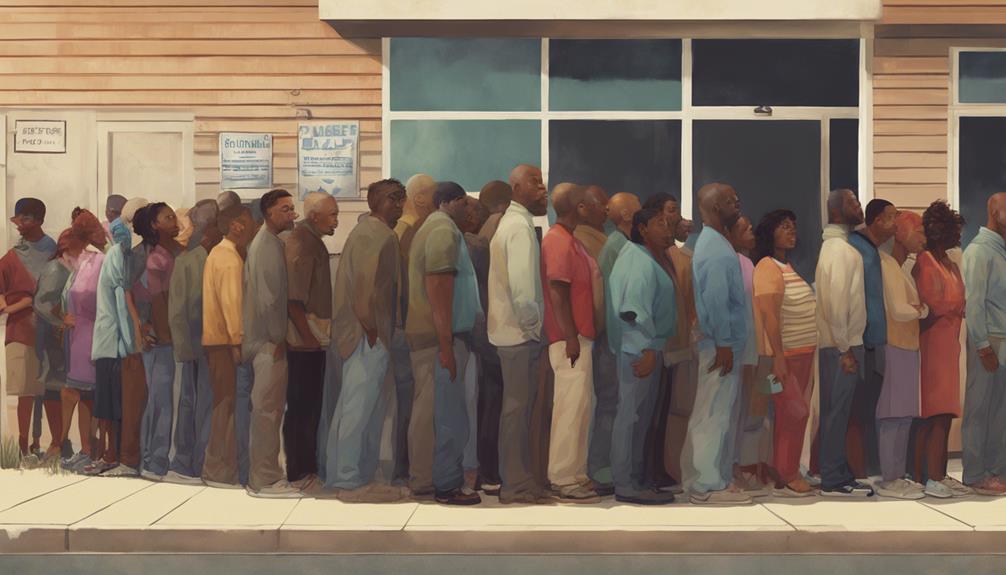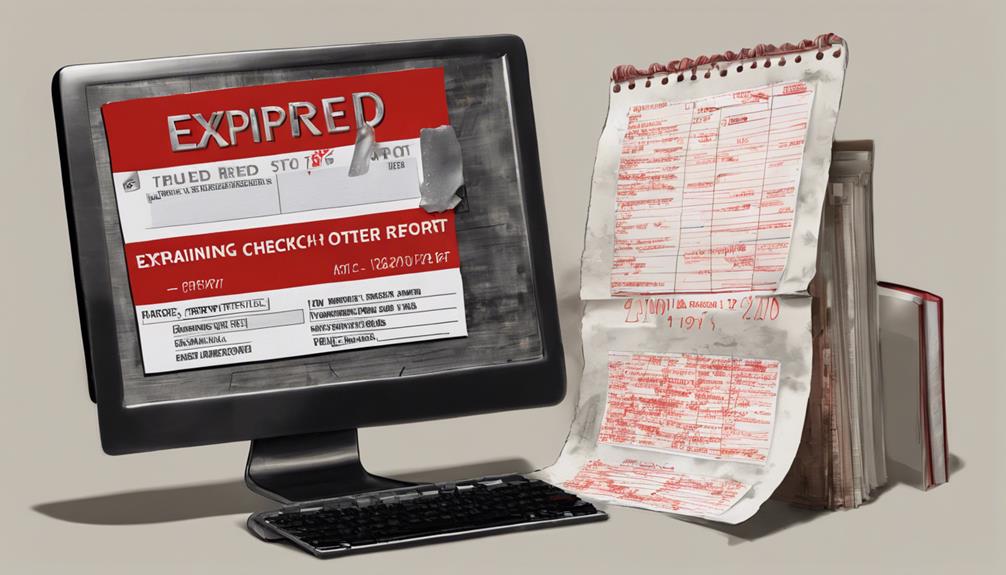Section 8 conducts thorough background checks on applicants, examining public records for criminal activities that may affect eligibility. These checks focus on violent crimes, drug-related evictions, and sex offender registration within the last 5 years. Additionally, out-of-state criminal records can be accessed with proper certification. These meticulous checks are essential for ensuring the safety and well-being of tenants and the community, as well as determining Section 8 eligibility based on fair evaluation processes.
Key Takeaways
- Section 8 conducts thorough background checks on all applicants.
- Scrutinizes criminal records for eligibility determination.
- Focus on violent crimes, drug-related evictions, and sex offender registration.
- Out-of-state criminal records accessed with proper certification.
- Ensures safety and eligibility through comprehensive evaluations.
Public Records Screening for Section 8

Section 8 routinely performs public records screenings to evaluate applicants' criminal backgrounds for its Housing Choice program. This process involves thorough checks for any past criminal activities, with a specific focus on violent crimes and drug-related evictions. Convictions and arrests within the last 5 years are taken into consideration during the criminal background check.
It's important to note that certain charges, such as those requiring lifetime sex offender registration, can lead to automatic disqualification from Section 8. Applicants are expected to provide accurate information regarding their criminal history, as any discrepancies discovered during the screening process may result in rejection from the program.
Criminal Offender Record Information (CORI) Reports
Criminal Offender Record Information (CORI) reports play a vital role in evaluating applicants' criminal backgrounds for Section 8's Housing Choice program. These reports are utilized to scrutinize all criminal activities, regardless of the outcome, ensuring a thorough evaluation.
Section 8 conducts detailed screenings of public records, focusing on convictions and arrests within the last five years. Specific criminal charges such as drug-related evictions, violent crimes, and lifetime sex offender registration can result in the rejection of Section 8 voucher applications.
Furthermore, Section 8 has the authority to access out-of-state criminal records by obtaining special certification to enhance the scrutiny of applicants' criminal histories. It's essential for applicants to provide accurate information regarding past criminal activities on their Section 8 applications.
Misrepresentation or inaccuracies in this regard can lead to denial and disqualification from the Section 8 program. The rigorous evaluation of CORI reports underscores Section 8's dedication to ensuring the safety and well-being of its housing communities.
Out-of-State Records Check

Section 8 housing authorities conduct extensive out-of-state criminal records checks for all applicants. By having the ability to access criminal records from other states, PHAs can guarantee a thorough review of an applicant's background.
Special certification is obtained to retrieve out-of-state criminal records, which are vital in determining Section 8 eligibility.
Interstate Record Verification
When conducting background checks for Section 8 applicants, verifying out-of-state records is necessary to gain a thorough understanding of their criminal history.
Accessing out-of-state criminal records is a critical part of the background check process for Section 8 applicants. Public Housing Authorities (PHAs) have the capability to check criminal backgrounds from other states by obtaining special certification.
By performing interstate record verifications, Section 8 can extensively assess an applicant's criminal history. Out-of-state records play a significant role in helping Section 8 make informed decisions regarding applicant eligibility.
This process ensures that Section 8 considers all relevant information when determining whether an applicant meets the program's requirements. As a result, interstate record verification is an important step in the background check process for Section 8 applicants, enabling a more thorough evaluation of their criminal background.
Remote State Checks
Accessing out-of-state criminal records for Section 8 applicants is facilitated through a specialized validation process. Checking out-of-state criminal records allows for a more thorough evaluation of an applicant's criminal history. Here's how the process works:
- Validation Process: Public Housing Authorities (PHAs) obtain validation to access criminal records from other states.
- Comprehensive Evaluation: Remote state checks help guarantee that applicants with criminal records in other states aren't overlooked.
- Informed Decisions: PHAs utilize out-of-state records checks to make well-informed choices about applicant eligibility.
- Enhanced Background Checks: Access to out-of-state criminal records enhances the overall background check process for Section 8 applicants.
Out-of-State Verification
Utilizing special certification, Public Housing Authorities can conduct out-of-state verification for Section 8 applicants by checking criminal records from states other than the applicant's current residence. This process allows PHAs to obtain a more comprehensive view of an applicant's criminal history, ensuring a thorough assessment for Section 8 eligibility. Out-of-state verification is a crucial step in the background check process to accurately evaluate an individual's suitability for housing assistance.
| Out-of-State Verification | Importance |
|---|---|
| Ensures comprehensive criminal history review | Crucial for accurate eligibility assessment |
| Requires special authorization | Necessary for accessing records across state lines |
| Enhances background check process | Provides a more thorough evaluation |
| Validates applicant information | Verifies credibility of provided details |
| Promotes fair selection criteria | Helps maintain a safe living environment |
Obtaining Your Own Public Record
To acquire a copy of your public record, you can request it directly from agencies such as the FBI, state police, or local police. If you need information specifically about your criminal record, submitting fingerprints may be necessary. Officers at these agencies can provide details on what information is revealed in your public record.
Different agencies maintain criminal records with varying parameters and levels of detail. Keep in mind that Public Housing Authorities (PHAs) have the ability to access criminal records from other states for background checks, so it's essential to ensure accuracy and completeness in your public record.
- Imagine walking into a local police station and submitting a request for your public record.
- Picture the process of providing your fingerprints for a thorough check of your criminal record.
- Visualize speaking to officers who can explain the information contained in your public record.
- Envision the varying levels of detail and parameters in criminal records maintained by different agencies.
Section 8 Eligibility for Felons

Section 8 eligibility for felons hinges on various factors, such as the type of felony committed and how long ago it occurred. Certain serious felonies like drug trafficking or violent crimes may result in disqualification from the Section 8 program.
Additionally, a history of substance abuse or endangering others' safety through drug or alcohol misuse can impact felons' eligibility for Section 8 assistance.
Felon Eligibility Criteria
Felons seeking Section 8 assistance encounter varying eligibility criteria set by Public Housing Authorities (PHAs). When appraising felon eligibility for the Housing Choice Voucher Program, PHAs consider several factors:
- Time Since Felony: Some PHAs accept applicants with felonies that occurred over 5 years ago.
- Nature of Criminal Charges: Charges such as drug smuggling, violence, or fraud may lead to rejection of Section 8 applications.
- Behavioral History: Inconsistent rent payments, history of alcohol or drug use, and specific criminal charges can disqualify felons from Section 8.
- Disqualifying Factors: Lifetime sex offender registration, drug production in federal housing, and endangering others' safety through drug or alcohol abuse are factors that can disqualify individuals from the program.
Criminal Background Checks
When evaluating eligibility for Section 8 assistance, criminal background checks are conducted to determine if applicants meet the necessary criteria. The Housing Authority reviews the criminal history of applicants to assess their suitability for the program. Certain convictions, such as drug-related felonies and violent crimes, can result in disqualification from receiving Section 8 assistance.
However, PHAs consider factors like the severity of the offense and the time elapsed since the conviction when making determinations. Applicants with outstanding debts to the Housing Authority or other entities may also face challenges in qualifying for Section 8 assistance.
The process involves a thorough examination of all relevant circumstances, providing applicants with the opportunity to dispute any inaccuracies in their criminal records, and taking into account participation in rehabilitation programs as part of the evaluation process.
Criminal Charges Disqualifying Section 8 Applicants
Applicants seeking Section 8 assistance may face disqualification based on specific criminal charges such as lifetime sex offender registration or drug production in federal housing.
When it comes to criminal charges that can lead to disqualification from Section 8, the following scenarios are typically considered:
- Lifetime Sex Offender Registration: Individuals subject to lifetime sex offender registration are usually ineligible for Section 8 vouchers due to the potential risk they may pose to other residents.
- Drug Production in Federal Housing: Those involved in drug production within federal housing premises are likely to be disqualified from receiving Section 8 assistance to maintain a safe environment for all tenants.
- Endangering Safety through Drug or Alcohol Abuse: Individuals who pose a safety risk to themselves or others due to drug or alcohol abuse may not qualify for Section 8 benefits to safeguard the well-being of the community.
- Drug-Related Evictions or Violent Crimes: Applicants with a history of drug-related evictions or convictions for violent crimes may also face disqualification under Section 8 guidelines to uphold the program's standards and security measures.
HUD Background Check Requirements

HUD's background check requirements play an important role in determining Section 8 eligibility.
Understanding the HUD background check criteria is essential for applicants maneuvering through the process.
Changes in HUD guidelines and the impact of technology are key aspects to keep in mind here.
HUD Background Check Criteria
How does HUD determine the criteria for background checks in the Section 8 Voucher program?
HUD sets specific guidelines that Public Housing Authorities must follow when conducting background checks for Section 8 Voucher applicants. These criteria include:
- Mandatory Offenses: HUD regulations stipulate certain offenses that can lead to automatic denial during the background check process.
- Case Evaluation: All relevant circumstances surrounding an applicant's criminal background are carefully evaluated before a final decision is made based on the background check results.
- Dispute Process: Applicants are given the opportunity to dispute the accuracy of their criminal record if they believe there are errors or misunderstandings.
- Debt Consideration: Outstanding debts owed to the Housing Authority or other relevant authorities can also impact the background check process and potentially lead to denial of Section 8 Voucher eligibility.
Changes in HUD Guidelines
HUD's recent guidance on background checks for rental applicants signals a shift towards a more nuanced approach to evaluating criminal records for Section 8 Voucher eligibility. The new guidelines emphasize the importance of analyzing individual circumstances before making decisions based on criminal history.
This approach deviates from the previous stricter criteria that often led to automatic rejections based on any criminal conviction. With approximately one-third of the U.S. population having some form of criminal record, HUD recognizes the need to ensure equitable housing practices by reconsidering its screening policies.
The Fair Housing Act prohibits discrimination against protected classes, including individuals with criminal records, underscoring the importance of aligning background check requirements with anti-discrimination laws.
While advancements in technology have made background checks more efficient, concerns remain regarding the accuracy and completeness of the information obtained, making it essential for HUD to strike a balance between thorough screenings and upholding applicants' rights during the evaluation process.
Impact of Technology
With the integration of advanced technology, landlords now have enhanced tools for conducting background checks on Section 8 rental applicants. However, the impact of technology on these checks can have both positive and negative implications:
- Increased Efficiency: Technology streamlines the background check process, allowing for quicker results and decision-making.
- Potential Lack of Detail: While technology makes background checks easier, some results may lack individual-specific details, potentially leading to oversights.
- Risk of Inaccuracies: There's a possibility of inaccuracies in the information provided by technology, which can pose challenges in disputing errors.
- Simplified Results: Technology may provide simplified pass or fail results, which mightn't offer a nuanced view of an applicant's background, potentially overlooking important aspects.
Disqualifying Factors for Section 8
Certain criminal convictions, including drug-related felonies, violent crimes, and lifetime sex offender registration, can lead to disqualification from Section 8 housing assistance.
Applicants with a history of drug production in federal housing or endangering others' safety through drug or alcohol abuse may face automatic disqualification. Additionally, specific felony convictions, drug-related evictions, and lifetime sex offender registration can result in denial of Section 8 housing assistance.
Public Housing Authorities (PHAs) hold the power to reject Section 8 applications based on threatening behaviors, violent offenses, drug-related evictions, and certain criminal convictions within the past five years. Factors such as felony convictions, a record of drug or alcohol abuse, inconsistent rent payments, and criminal charges like drug production in federal housing can all impact an applicant's eligibility for Section 8.
It's important for applicants to be aware of these disqualifying factors to secure a smooth application process for Section 8 housing assistance.
Monitoring by Section 8

Section 8 closely monitors applicants' criminal backgrounds through thorough background checks to determine their eligibility for housing assistance. When making decisions based on applicants' criminal backgrounds, Section 8 follows specific guidelines and procedures:
- Automated Denial: Certain criminal offenses outlined in HUD regulations can lead to automatic denial of housing assistance by Section 8.
- Dispute Process: Applicants have the opportunity to dispute the accuracy of their criminal records during the background check process, ensuring fairness and accuracy.
- Consideration of Circumstances: Section 8 considers all relevant circumstances surrounding an applicant's criminal background before making decisions, allowing for a more holistic assessment.
- Debts Impact: Outstanding debts to HACA or other housing authorities can also influence Section 8's decision-making process, potentially resulting in denial of housing assistance.
Through these measures, Section 8 maintains a vigilant approach to monitoring applicants' criminal backgrounds while ensuring a fair and thorough evaluation process.
Section 8 and Public Records
Section 8 evaluates applicants' criminal histories by conducting background checks using public records. These records are scrutinized to uncover any past criminal activities that could impact eligibility for Section 8 housing assistance.
Convictions and arrests within the last 5 years are particularly taken into consideration during these checks. Public records revealing violent crimes, drug-related evictions, and lifetime sex offender registration can result in the denial of Section 8 vouchers.
Additionally, Section 8 has the authority to access out-of-state criminal records with proper certification to thoroughly assess applicants' backgrounds.
By utilizing public records in their background checks, Section 8 aims to guarantee the safety and well-being of current tenants and the community as a whole.
Applicants should be aware that their criminal histories are a key factor in determining their eligibility for Section 8 housing assistance.
Frequently Asked Questions
What Criminal Charges Disqualify You From Section 8 in Pa?
Certain criminal charges disqualify individuals from Section 8 in Pennsylvania. These include lifetime sex offender registration, drug-related felonies, drug production in federal housing, endangering others through drug/alcohol abuse, violent crimes, and specific felonies within the last 5 years.
What Criminal Charges Disqualify You From Section 8 in Illinois?
Certain criminal charges like drug production in federal housing, endangering safety through substance abuse, and lifetime sex offender registration can disqualify individuals from Section 8 in Illinois. Specific offenses have serious implications for eligibility.
What Disqualifies You From Section 8 Housing in California?
Certain criminal convictions, including lifetime sex offender registration, drug-related felonies, and violent crimes, can disqualify individuals from Section 8 housing in California. The Housing Authority may deny assistance based on specific criminal backgrounds.
What Criminal Charges Disqualify You From Section 8 in Massachusetts?
Certain criminal charges disqualify individuals from Section 8 in Massachusetts, such as lifetime sex offender registration, drug production in federal housing, and endangering others' safety through drug or alcohol abuse. PHAs have the discretion to reject applications based on specific offenses.
How Do Background Checks Work for Housing Assistance Programs Like Section 8?
When applying for housing assistance programs like Section 8, potential tenants undergo a thorough background check. This process helps to ensure that individuals have a clean record and good financial standing. The goal is to maintain a high level of wag background check performance to uphold the integrity of the program and provide safe and suitable housing for those in need.
Conclusion
To sum up, Section 8 does perform background checks to guarantee the safety and integrity of their housing programs.
These checks include public records screenings, criminal offender reports, and out-of-state records checks.
Just like a diligent detective uncovering clues, Section 8 carefully examines each applicant's history to ascertain eligibility for assistance.









